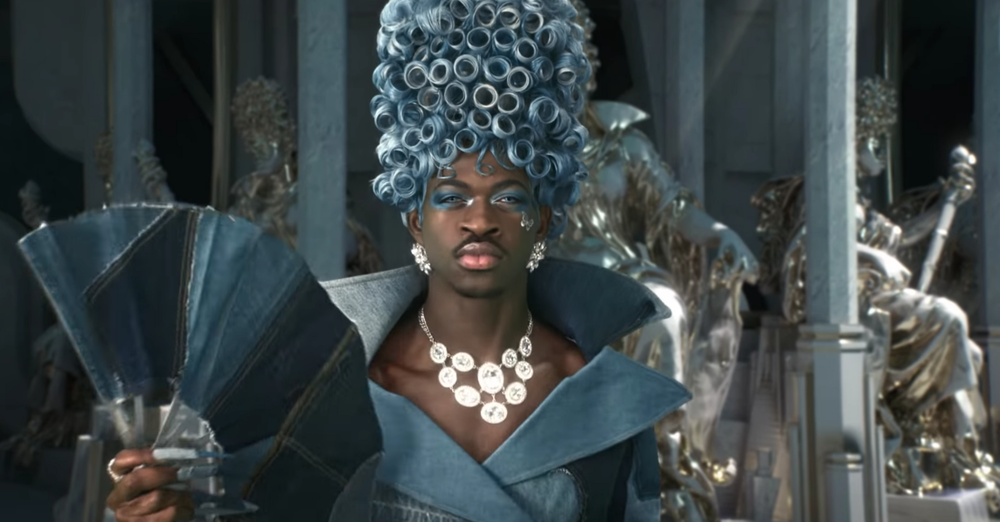The video for Lil Nas X’s “Montero (Call Me By Your Name)” may not shock everyone who encounters it, but I think it’s safe to say that it is shocking to most people who encounter it. I find this shock largely amusing, but then I’m a Prince fan who played Dungeons & Dragons in the ’80s. I’ve seen this kind of pearl-clutching before.
Everything about Lil Nas X is hilarious and his resting smirk face suggests even he thinks so. He knows what he’s doing with his music, and his videos, and his presence, and he doesn’t care that you know that he knows. Lil Nas X is a troll with a budget, and the most important question about his work is if you are going to be the subject of his trolling. And the quickest way to answer that question is to decide if you are genuinely offended, damaged, or hurt by what he presents — but more importantly, by what he represents. Because no one is really offended by the presence of sexuality or blasphemy in music that they like. What people are offended by is Lil Nas X’s sexuality specifically.
If you don’t like his music that’s completely understandable, though I must admit I’m not at all interested in whether or not anybody likes his music. What I find vastly more interesting is whether anybody is offended by the execution of his rights.
I saw my first Prince record at seven years old; he was naked and riding a pegasus on the back cover of the album. Not once was I ever tempted to strip naked and jump on the back of a sawhorse in response.
Admittedly, Black communities have a different relationship with that question than other communities. We lean a little more conservative on sexual politics in the public sphere than some, and for a variety of historical reasons, most of them traumatic. It’s only within the last generation that Lil Nas X’s career is possible at the level at which he succeeds. Yes, Bessie Smith was real. Yes, Da Brat was real. But none of them experienced the level of access and cultural penetration that Lil Nas X is as a gay being. And as Black communities continue to struggle with broadening definitions of masculinity and respectability politics, for many people Lil Nas X represents a danger. It is not a real danger, but that is how those who see manhood and religious precept a certain way perceive it, and of course, they are wrong.
If Black queer art sets the progress of Black people back, then you should probably stop teaching the Harlem Renaissance in schools. That was as much a queer movement as it was a Black movement, yet Langston Hughes is largely seen as the greatest Black poet to have existed. If queer representation in Black letters could have destroyed Blackness, then why are we ever talking about James Baldwin? Do I even need to list the ways in which Prince is partially responsible for modern Black sexual expression in popular music? Or remind you that we had these same arguments over Controversy and the first 10 seconds of his video bathtub entrance to “When Doves Cry”? Or when Prince put a whole penis on the cover of 1999, and because of that I had to sit in a Bible study class and have a deacon explain to a room full of children how satanic it was? I saw my first Prince record at seven years old; he was naked and riding a pegasus on the back cover of the album. Not once was I ever tempted to strip naked and jump on the back of a sawhorse in response.
If you fear that this video or song will make children do something nefarious, then you do not understand the world that children are experiencing in 2021. There are exactly zero messages in this video or song that many of the people decrying the work aren’t advertising in their own ways on a daily basis. I only watched the series P Valley because I felt the need to be conversant in it because so many people were talking about it all the time. I didn’t want to be the weirdo at the party who hadn’t seen the hip thing or didn’t get the jokes. The average song on Black radio is trifling. So what are we really arguing about here in terms of what children are accessing? When people talk about music and art and how these things can harm children, it’s a feint. They are speaking almost entirely on behalf of their own ideas, values, and prejudices. I’m not saying show the “Montero” video to children; I’m saying don’t use children to cover up your issues.
Let’s be clear: There is no clearinghouse for Blackness. There is no license, no card, no meeting, no agenda — save survival. Survival is perhaps the one value that all Black people share, including Lil Nas X. If the song offends you, that is its intent. If the video scares you, that too is part of its intent. “Montero” is not a calling in; it is a calling out.
